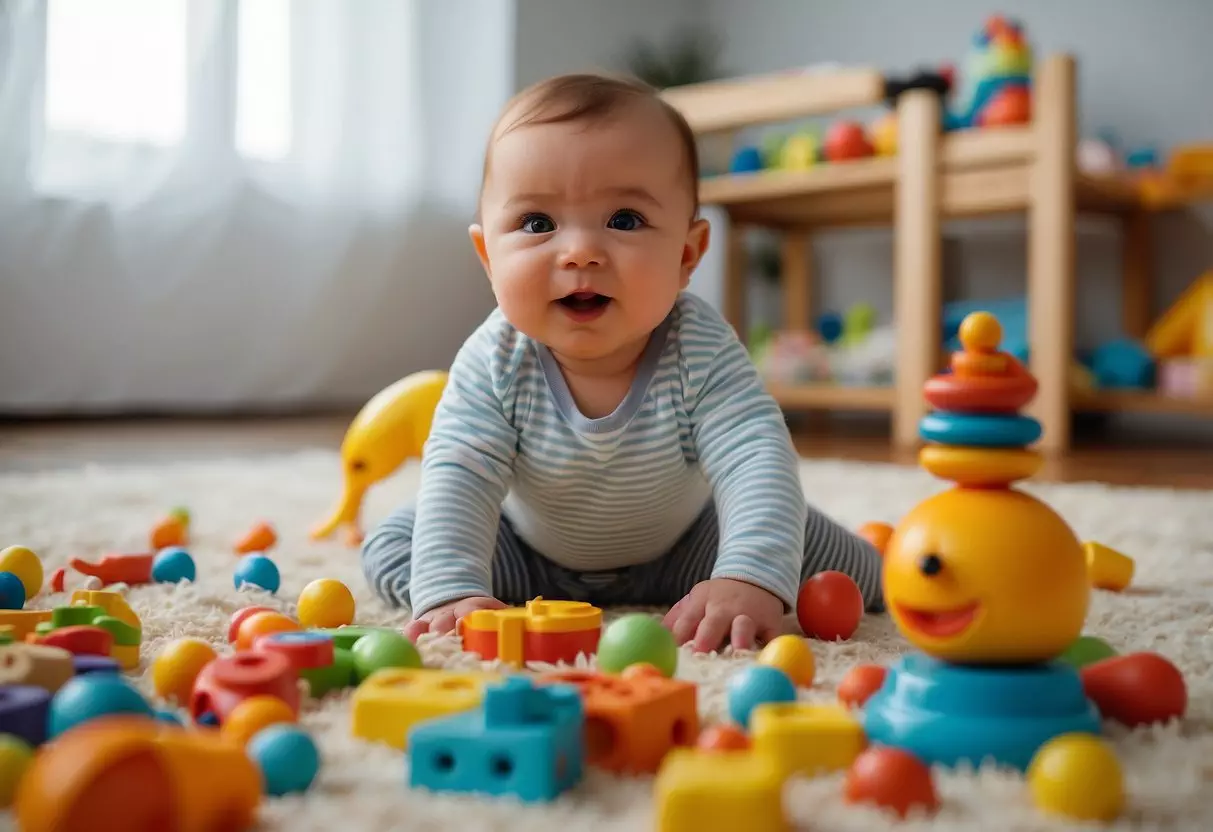Should an 8 Month Old Be Talking? What to Expect at This Age
By the time your baby reaches eight months old, you start to wonder about important milestones, including communication skills. At eight months, it’s typical for babies to start babbling, making sounds like “mama” and “dada,” though they might not use these words specifically to address you. These early vocalizations are an exciting development, showing that your baby’s language skills are progressing.

It’s natural to be concerned if your little one isn’t babbling yet. While many babies do start making noises around this age, every child develops at their own pace. Some babies might be more interested in other skills, like crawling or exploring their surroundings. According to Verywell Family, at eight months, babies often reach various milestones, such as making sounds back when talked to or recognizing familiar faces.
If you’re worried about your baby’s progress, it never hurts to talk to your pediatrician. They can provide reassurance or suggest further evaluation if needed. Remember, some babies may fall into the “late but still normal” category, as discussed here, so try not to stress too much. Every baby is unique and will reach milestones at their own pace.
Table of Contents
Understanding Baby Language Development
At around eight months, babies begin to hit some exciting milestones in their language development. They start to babble more and may even say their first word soon.
Early Communication Milestones
By six months, your baby might start to make gurgling sounds. These sounds are your baby’s first attempts at babbling and play a key role in their language skills.
Around this time, babies also begin using their voice to show likes and dislikes. This includes giggles when happy and fussing when frustrated.
Simple words like “ba-ba” and “da-da” may appear, although not used with meaning yet. Babies may also start to use gestures to communicate their needs or interest in objects. These early forms of communication are crucial steps towards developing a fuller vocabulary.
Normal Speech Progression
At eight months, your baby’s babbling becomes more varied. You may hear more speech sounds such as m, p, and b, and they will start imitating common intonation patterns from your speech.
Your baby might respond to different tones of your voice. For example, they might look toward a toy when you say its name, showing they understand simple words.
By their first birthday, they often say their first word. Although, don’t worry if this is delayed slightly. All babies develop at their own pace, and each step is important in building their full language and grammar skills.
Understanding these normal progressions helps you as a parent to support and encourage your baby’s language development effectively.
For more details on language milestones and how to encourage them, you might find this guide helpful.
Supporting Your Baby’s Speech and Language Skills

At eight months, your baby is soaking up everything around them and starting to communicate in their own special ways. Here are some effective strategies to help boost their speech and language development.
Engaging Through Play and Reading
Playing and reading with your baby are powerful tools for language development. When you read to your baby, they get to hear different words and sounds, which helps them when they begin talking. Choose books with colorful pictures and simple stories.
Interactive play, like peek-a-boo or singing nursery rhymes, helps your baby learn to take turns in conversation. Even simple games like stacking blocks can create opportunities for communication. Describe actions and objects during playtime to build their vocabulary.
Tips for reading and play:
- Use board books with large pictures.
- Repeat favorite stories often.
- Sing songs and rhymes with gestures.
Effective Use of Gestures and Signs
Using gestures and signs can bridge the gap between babbling and speaking first words. Simple signs like “more” or “milk” paired with the spoken word can help your baby understand and use language more easily.
Encourage your baby to imitate your gestures. This form of nonverbal communication teaches them about the give-and-take of conversation. Pointing at objects while naming them also helps your baby make connections between words and their meanings.
Gestures and signs tips:
- Start with basic, everyday signs.
- Consistently use gestures alongside words.
- Celebrate when your baby tries a new gesture.
Encouraging Babbling and Early Words
Babbling is an important step in your baby’s speech development. When they vocalize sounds like “ba-ba” or “da-da,” respond enthusiastically. Repeating sounds and turning them into simple words encourages your baby to keep trying.
Engage in “conversation” by asking your baby questions and pausing as if waiting for an answer. This shows them that communication is a two-way street. Praise their efforts to speak, even if it’s just babbling.
Tips for encouraging vocalization:
- Imitate your baby’s sounds.
- Talk about daily activities.
- Encourage back-and-forth sounds.
By incorporating these activities into your daily routine, you can support your baby’s journey toward their first words and beyond.
Nutrition and Physical Milestones Relation to Speech

Both nutrition and physical milestones are crucial for your baby’s speech development. Proper nutrition supports brain growth, while physical abilities help them explore and communicate more effectively.
Importance of Nutrition for Cognitive Growth
Good nutrition is essential for your baby’s brain development. At 8 months old, your baby might start eating solid foods in addition to breast milk or formula. Introducing iron-rich foods, like pureed meats and fortified cereals, can help support cognitive growth.
Iron is vital for brain development and may affect how well your baby learns to speak. Foods like spinach, beans, and sweet potatoes are also good sources of iron. Don’t forget to include fruits and vegetables to ensure a balanced diet.
Breast milk or formula should still be a major part of your baby’s diet. Both provide necessary nutrients that help in brain development and, in turn, support early speech skills.
Physical Development and Communication
Physical milestones at 8 months old play a role in your baby’s ability to communicate. As your baby begins crawling, it strengthens their muscles and improves their motor skills. Crawling helps with the coordination needed for other forms of movement, like pulling to stand or eventually walking.
Developing motor skills, like the pincer grasp, also aids in communication. This fine motor skill allows your baby to pick up small objects and interact with their environment, giving them more ways to express their needs and interests.
Hand-eye coordination improves as your baby reaches for and manipulates objects. These skills not only support physical development but also enhance their ability to understand and use language. Watching for these milestones can help you gauge your baby’s progress in both motor and speech development.
When to Seek Guidance

It’s natural for parents to worry about their child’s development. While some variation is normal, knowing key signs can help you decide if it’s time to get professional advice.
Monitoring Baby Milestones
At 8 months, there are specific baby milestones to watch for. Your baby might make sounds when spoken to and respond to their name. If your baby isn’t showing these signs, it might be a good idea to observe further. Tracking these developmental milestones can help you understand what’s going on and if there’s cause for concern.
Some babies might also display stranger anxiety and separation anxiety around this age. If your baby isn’t showing these signs, it doesn’t necessarily mean there is a problem, but it’s something to keep in mind. Regularly monitoring these milestones can give you a clearer picture.
Talking to Your Healthcare Provider
If you have concerns about your baby’s speech and language development, don’t hesitate to speak with a healthcare provider. They can provide professional insights and may suggest seeing a specialist if needed. Open communication with your healthcare provider ensures your baby gets the best support possible.
Early intervention is key, so mentioning any delays or worries as soon as possible can help address potential issues. Sharing detailed observations can help your provider make an accurate assessment. Keep a list of milestones your baby has or hasn’t met to make the conversation productive.
